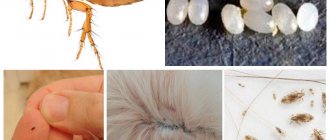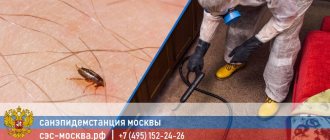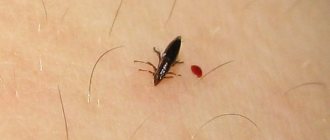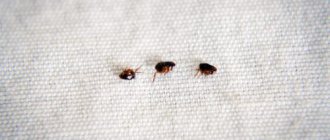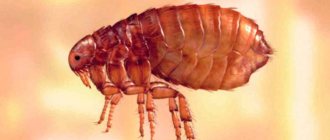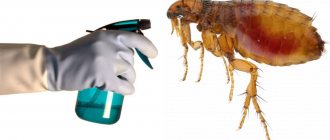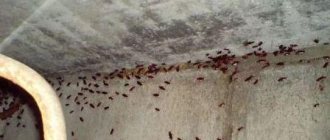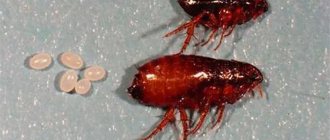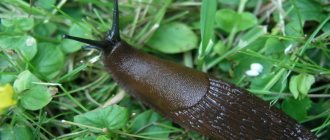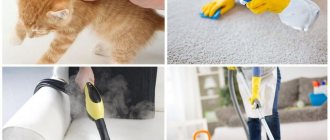Even in new urban buildings, residents are often annoyed by blood-sucking insects. Cellar fleas are representatives of this class of parasites. Due to the characteristics of their diet and way of surviving, it is recommended to constantly fight for the cleanliness of the entrance and basement, making appropriate demands on your management company.
Cellar fleas are blood-sucking insects that transmit dangerous diseases.
Types and causes of basement fleas
Basement fleas are different types of fleas (there are more than 14 in Moscow), which inhabit the ground floor of any building and can settle in public and trade organizations, a private cottage and a city high-rise building.
Among basement fleas you can find the following types of ectoparasites:
- human fleas;
- cat fleas;
- fleas of rats and mice;
- dog fleas.
They can get into the basement in different ways, but the most common reason for their appearance is unsanitary conditions in such premises, where carriers of blood-sucking insects can penetrate.
By remaining in the basement even for a short time, stray animals, people or rodents can infect the building. The peculiarity of fleas is that they scatter small portions of eggs every day, which do not remain on the host’s fur, but fall on the floor and other horizontal surfaces. After about 2 weeks, larvae appear - small worm-like creatures that feed on any decaying organic matter.
Types of fleas.
After 3 molts, the larva pupates, and after a few more days an adult emerges from the cocoon. A young flea is unable to reproduce until it begins to feed on blood. She does not die from hunger, enduring it painlessly for several weeks until the opportunity presents itself to jump on an emerging victim. In this case, a person can be bitten by different types of parasites.
In basement conditions where there are no negative temperatures, fleas feel good even in winter. If there is a food supply (people, animals, birds), they continue to reproduce all year round.
Fleas easily move long distances, are able to climb stairs, move along the walls of garbage chutes, ventilation, etc.
When a person or pet appears within reach, bloodsuckers penetrate into apartments, jumping onto clothing or fur.
Often the cause of the appearance of basement fleas is the residents themselves, who allow stray animals into the entrance or basement.
Distinctive features
Basement or ground fleas prefer damp and dark rooms, so basements of houses that are poorly maintained and often flooded are an ideal place for them.
This article is about insects 0.5 mm in size, capable of jumping to a height of up to 1 m. They have a brown or black chitin color and are practically invisible to the naked eye on the floor.
Fleas feed on the blood of animals and humans. Their reproduction rate is quite high, so at the first suspicion it is necessary to immediately disinfect the premises.
Fleas feed on the blood of animals and humans. Their reproduction rate is quite high, so at the first suspicion it is necessary to immediately disinfect the premises
What danger do they pose?
Fleas can remain on the surface of the host's body or in its shelter for several days and weeks. Most often, when parasites are bitten by a host animal, the adult individual leaves it and, when the opportunity arises, moves to another victim, choosing it at random. Most varieties of bloodsuckers do not adhere to one type of animal (except for those that parasitize bats) and bite both humans, pets, and rodents in the basement.
Diseases transmitted by fleas.
In humans, fleas cause a disease called pulicosis (from the Latin name for the human flea Pulex irritans). When bitten, an itchy rash appears on the skin; in severe cases, allergens enter the nervous system through the lymphatic system and can cause ulcers in the throat and mouth.
In addition to an allergic reaction to the enzymes of the parasites themselves, most varieties of fleas are dangerous in their ability to carry pathogens of dangerous infections:
- endemic and epidemic typhus;
- plague;
- hepatitis B and C;
- tick-borne encephalitis;
- brucellosis;
- salmonellosis;
- pseudotuberculosis, etc.
A flea, having received the causative agent of the disease (virus or bacteria) with the blood of an infected rodent or person, is able to transmit it to a new owner within 3-150 days.
How to recognize parasites
Insect characteristics:
- the insect is difficult to detect because its length is only 0.6 mm;
- body shape – flattened on the sides, and thickened in the abdominal area;
- body color – brownish, sometimes light brownish or yellowish-brownish;
- they can be found on pet fur, in cracks between baseboards or trim, and also in cracks in the floor. Being in such a shelter, they wait for their prey, and then jump on it to bite it, drinking a drop of blood;
- bite sites are characterized by redness, severe pain and a feeling of discomfort.
Where to go if basement fleas appear in an apartment building?
If fleas from the basement penetrate into apartments, you must contact the management company so that its workers carry out disinfestation and deratization of the premises (treatment against insects and rodents).
If only 1 type of treatment is carried out, the destruction will be temporary.
The management company is also obliged to ensure that stray animals do not live in the basement, homeless people do not spend the night, and there are no rubbish piles.
If the management company fails to fulfill its obligations, you can contact the housing inspectorate and the SES.
Locations
In a house, fleas prefer to live in the lower tier, at a level no higher than one and a half meters from the floor level.
They hide behind baseboards, in cracks, under furniture and in carpets. Long-pile carpets provide an ideal haven for basement fleas. If there is low upholstered furniture, they can also live in it.
If there are animals at home, fleas will settle on them. In this case, it is easier to suspect the presence of insects at an early stage of infestation at home: if pets begin to itch, then fleas have appeared in the house.
Most often, fleas initially enter the first floor of a house from the basement. And then they spread higher through cracks and ventilation holes.
Flea bites are painful. But this is not the only danger facing residents of houses where parasites have settled.
This article will tell you about choosing a method of fighting fleas in the house.
Ways to get rid of fleas and eliminate larvae
The only way to get rid of biting synanthropic parasites is total persecution of adults and their larvae. You can remove insects from your home using both folk and chemical means. But bloodsuckers will be able to penetrate into a clean apartment again, regardless of the type of human habitation. For example, in St. Petersburg, basement fleas appear from somewhere not only on the first floor, but also on the 15th floor of new apartment buildings.
Comprehensive insect control should begin with the treatment of pets. Vet pharmacies have affordable medications for cats and dogs of all ages (Bars, Frontline, Hearts, etc.).
They need to be applied according to the instructions: drops on the withers, sprays and shampoos to treat the pet’s entire body, etc. An effective remedy is collars (for example, Beafar).
In a private home, in addition to treating animals, it is necessary to independently destroy the rodents that live in utility rooms. Poison for rats and mice can be purchased at the SES or pet store, or hardware stores. After deratization, you need to begin treating the basement premises from the parasites and their larvae living there.
Effective flea treatments for pets.
Flea chemicals
If there are fleas in the basement and in the living area, you can poison them with any household sprays designed to kill insects at home.
When choosing a product, it is advisable to pay attention not only to the name of the drug, but also to its purpose: products for crawling species (bugs, cockroaches, etc.) will be most effective against fleas.
The most effective drugs are those containing permethrin, cypermethrin, etc.:
- Raptor (spray for treating premises against cockroaches, fleas, bedbugs, etc.);
- Raid (aerosol packaging);
- Battalion commander
In addition to them, the use of other poisons is also allowed: Karbofos, Dichlorvos, Chlorophos and the like.
The drugs are also available in concentrated form for self-preparation of solutions (Tetrix, Cucaracha, Tsifox, etc.). In this case, treatment is carried out using a sprayer.
Effective insecticides for treating apartments.
Powdered dusts (DDT) are also effective against fleas. They need to be sprayed with special devices.
Powders are used only for treating rooms where people or pets are not constantly present (for example, you can dust the floor in the basement, and use aerosols in the house).
Chemicals quickly destroy any insects that fall on their covers. Remaining on the surfaces of the floor, cracks, etc., aerosol products continue to act for several more days.
Powdered preparations have a longer duration of action and are capable of destroying flea larvae leaving eggs, cockroaches and bedbugs, as well as harmless but unwanted human neighbors (woodlice, two-wort, beetles, spiders, etc.).
Folk methods of struggle
Unlike chemicals, traditional methods are not as effective. They are aimed rather at preventing the appearance of insects: aromatic herbs, which are used to get rid of fleas, expel parasites without destroying them. Such remedies include decoctions of lavender, wormwood, tansy, etc.
Garlic tincture is a folk remedy for killing basement fleas.
Garlic infusion is also used to expel bloodsuckers:
- Pour crushed garlic (2-3 medium heads) with cold water (10 l);
- leave for 3-4 days, then strain and spray the walls and floors in the basement and other utility rooms;
- repeat treatment once a week.
In non-residential premises (in the basement), a sulfur bomb will help destroy insects. It can only be used in cases where the exit from the basement floor is on the street. Before lighting the sulfur, you need to seal the windows and seal the front door so that the smoke remains in the room for 1-2 days, destroying not only fleas, but also rodents, fungi and putrefactive bacteria.
Apartment pest control
Before poisoning fleas in an apartment, it is necessary to thoroughly clean the room: eggs and larvae can end up anywhere. The following activities need to be completed:
- carry out a complete wet cleaning (wipe off dust, wash floors and horizontal surfaces), you can add vinegar to the water (1 glass per 10 liters);
- wash or dry-clean clothes, bed linen, soft toys, slippers and textiles from sofas, armchairs, etc.;
- pay special attention to cleaning pet equipment: beds, toys, cages;
- Take upholstered furniture and large items that cannot be washed (blankets, pillows, etc.) outside and thoroughly knock the dust out of them or treat them with a steam generator (for example, carpeting on the floor).
Products containing permethrin are dangerous to fish and aquatic fauna. The aquarium must be closed before treatment. The remaining pets and children are removed from the apartment for 5-6 hours until the fleas are destroyed.
Disinsection of residential premises from fleas.
When the living area is ready for disinfestation, all rooms in the house need to be treated sequentially with insect repellent sprays:
- spray corners and spaces under furniture;
- try to fill all the cracks well at a height of about 1.5 m;
- spray on the surfaces of upholstered furniture and pay attention to careful treatment of the joints between the back and seat, armrests, pour over the bed frame and mattress seams;
- close the room and move on to spraying the next one.
When the treatment is completely completed, it is advisable to leave the home closed for several hours. Then ventilate the apartment, wipe all open surfaces with a damp cloth. There is no need to remove drug residues in hard-to-reach places and crevices: often flea larvae live there, and it will be problematic to destroy them immediately. But when moving, they will come into contact with traces of poisons and die within 2-3 days.
Treatment of pets
Pets are treated for fleas using special means. Bars is considered the most effective, but it is recommended only for adult dogs and cats. The drug contains permethrin and may cause allergies.
For kittens, puppies and small pets (hamsters, rats, rabbits, birds) use powders with natural Persian chamomile powder (for example, Pyrethrum) or shampoos. Most drugs are safe for animals and people, so there is no need to be afraid of their use.
The veterinary drugs Ivermectin (for injection) and Nitenpyram (for oral administration) can combat severe flea infestations. Before using medications, you should consult your veterinarian. He will prescribe an individual dosage depending on the weight and age of the pet, and give an injection of Ivermectin. After using such products, insects on the animal’s body die within 2-3 hours.
After treatment, it is necessary to put an anti-flea collar on the animal to prevent a new infection until the parasites in the house are completely destroyed.
Contact the professionals
Coping with the problem of basement fleas on your own can be extremely difficult, so in modern realities people are increasingly turning to the help of professionals. This is the easiest, most effective and safest way for the consumer to get rid of fleas, which gives a guaranteed long-term result of comprehensive disinfestation of premises. During disinfestation, professional products are used that have a long-lasting effect, which guarantees protection against parasites for a long time. The treatment is carried out by professionals who use the latest disinfestation technologies using professional equipment, which allows them to thoroughly and effectively treat contaminated areas. Upon completion, a guarantee is provided for free re-treatment if the expected result is not achieved after the first procedure. However, when choosing a disinfection company, you should pay attention to a number of important points so as not to be deceived and get the expected result. When choosing a company, you need to pay attention to:
- The company must have the appropriate documents allowing it to carry out disinfection work in residential premises (within the framework of the current legislation of the Russian Federation, work on disinfection is subject to licensing by order of the Ministry of Health of the Russian Federation dated March 11, 2013 No. 121n, the enterprise must have a license for medical activities, requirements for the organization and implementation of disinfection activities are established in the Sanitary and Epidemiological Rules SP 3.5.1378-03 “Sanitary and Epidemiological Requirements for the Organization and Implementation of Disinfection Activities”, approved by Resolution of the Chief State Sanitary Doctor of the Russian Federation dated 06/09/2013 N 131);
- Preparations that will be used for disinfection must be certified and safe for people and animals. Since disinfection is a complete treatment of the territory, including walls, furniture, baseboards, etc.;
- Events are planned at a time convenient for you, the company makes a compromise with the client;
- The workers spoke clearly and in detail about the upcoming event, the drugs that would be used, as well as whether it was possible to remain in the room after disinfection or whether it was necessary to leave it and for how long;
- A conscientious, self-respecting company does not require advance payment; all payments are made after the disinfection procedure;
- If you are not satisfied with the result, you are guaranteed either a refund or a free repeat procedure.
It is recommended to repeat this procedure once a year.
Treatment of a basement, entrance or cellar
Before you start fighting fleas in basements, you need to remove trash and debris from them, which serve as a breeding ground for larvae. If rodents live in the basement, they must be destroyed before flea sanitation begins. It is recommended to protect windows or ventilation openings with fine mesh to prevent rodents from entering the prepared room.
In an apartment building, all work on deratization, preparing the basement and treating it against fleas will be carried out by professionals from the SES, using special means.
If the treatment takes place in a private home, spraying is carried out independently. When using special concentrated products (Sinuzan, Tsifox, etc.), they must be diluted in accordance with the instructions.
The drugs are toxic, and during processing it is necessary to comply with safety precautions, the following is required:
Instructions for use of Tsifoks.
- put on overalls;
- protect your mouth, nose and eyes;
- use gloves.
The treatment is carried out with garden sprayers, allowing you to quickly fill and leave the basement. The room is left closed for several hours, then it can be ventilated.
It is advisable to repeat the treatment after 10 days in order to completely destroy new larvae that may have emerged from eggs that survived the first time.
In a small basement or cellar, you can also kill fleas with household aerosols. Spray raid or other product, directing the stream at walls and floors, shelving and other equipment. Leave the room closed for 5-6 hours, ventilate and take preventive measures so that bloodsuckers no longer penetrate there.
Services of professional firms
On the Russian market there are specialized companies engaged in breeding rodents, unwanted (stray) animals, and insects. They use effective means - aerosols, traps, and other methods. This procedure helps to quickly and efficiently achieve what you want. The cost of services depends on the location of the constituent entity of the Russian Federation. Citizens do not always have enough knowledge to combat fleas, and inaccurate information can aggravate the situation several times. The professional services of companies are often used by kindergartens, educational schools, technical schools, colleges, and industrial institutions.
Preventive measures
Adult fleas most often do not crawl across the thresholds of apartments or basement entrances, entering there on an animal or person. The use of crayons in this case is ineffective.
It is best to use powdered products (DDT, Deltamethrin, Pyrethrum, etc.). They penetrate well into cracks and hard-to-reach places, remain there for a long time and serve as poison both for adult insects seeking shelter and for their larvae, which swallow the drug when feeding.
Ventilating the premises in cold weather (spring, autumn) helps reduce the number of possible parasites in a basement where vegetables are not stored. Some of the larvae will die.
In apartment buildings, it is advisable to require the management company to carry out preventive treatments once every 3 months. Household trash (old furniture, textiles, organic waste, etc.) should not be stored in the basement. All entrances must be closed to prevent dogs and cats from entering.
Prevention of fleas entering an apartment should be the use of repellents when walking pets. The pets themselves are protected with collars, drops, and sprays against parasites.
Prevention
For preventive purposes, proven means of control should be used. The recommended period is from 10 to 14 days. After its completion, you can poison rodents (rats, mice, voles), and the larvae of various insects (if visible). You should also keep stray animals out, avoid accumulating garbage, and fix technical problems (leaks, holes) to avoid the accumulation of moisture (mold, dampness, fungus). It is allowed to use fumigators, catchers, and various traps for stray dogs, cats, rodents, wild animals and insects.
Advice! The building and basement should be tightly locked (with a lock or key), and if necessary, install protective grilles.
Getting rid of fleas is a periodic procedure. If you promptly treat the square meters of the basement (private or apartment building) and carry out preventive measures, you can forget about insects for a long time. It is not recommended to start disinfection to avoid the spread of viruses, diseases, and allergic reactions from bites.
